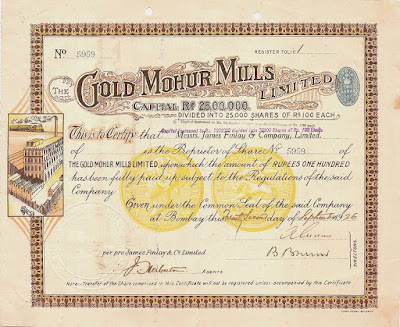The first steam powered cotton mill in India was founded in 1818 near Howrah, Kolkata as the Fort Gloster Mills. It was later renamed into the Bowreah Cotton Mills. The Oriental Hosiery Ltd, 1833, and the Wellington Jute Mills, 1855, were also set up in the Kolkata region. The first cotton mill that became operational in Mumbai, 1856, was the Bombay Spinning and Weaving Company. Demand for Indian cotton became heavy due to the American Civil War (1861-1865). By the 20th century hundreds of factories were set up in "mill village" Girangaon, Bombay, which became the Lancashire of India.
The Gold Mohur Mills Limited, 100 Rupees share certificate, 1926
Registered in 1926, the company's mills were situated at Dadar, Bombay
and were equipped with 40,540 spindles and 1,020 looms.
Capital: Rs.25,000,000 in 25,000 shares of Rs.100 each, fully paid.
source : Handbook of Textile Industry 1948, Bureau of Economic Research
When it comes to Indian scripophily, you can't miss the many, often charming, textile securities. Researching the companies and people behind these certificates is not always easy. Luckily, the Internet Archive, a non-profit library of millions of free resources, made available two interesting works for that purpose :
- Handbook Of Textile Industry 1948, by Singhania Padampat, and
- Textile India 1952, by Ghosh, Samarjit
Both digitized books contain lots of historic information and statistics on the cotton, woolen, worsted, jute, rayon and hosiery industries and the like. Each book has directories of the companies involved with a short description and their directors. Both can be downloaded as a large PDF file, but only the online versions are searchable.
The Gold Mohur Mill's share shows a mohur in the underprint. (click to enlarge )
The mohur is a 26 mm diam. gold coin, hence 'Gold Mohur'.
Several types were minted in British India and the local princely states allied with it.
obverse: head of Queen Victoria, 'VICTORIA QUEEN 1841'
reverse: lion and palm tree, 'EAST INDIA COMPANY ONE MOHUR'
The lion represents the British Crown and the palm tree the East.
F.L.
An interesting read? Why not sign the Guest book ?





